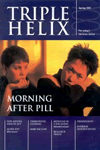The Western worldview has changed dramatically in the last two centuries. A summery of these changes can be found here
Imagine the scene. It is a busy ward in a large teaching hospital. A patient has collapsed, is unresponsive, there is no pulse. A 'Crash Call' goes out. The nurses start cardiac massage. The resus trolley is wheeled up, the de-fib fetched. The 'Crash Team' come running up the corridor. Cannula inserted, nervous fingers snap open ampoules. Adrenaline, Calcium, DC shock. No output. As the drama unfolds a nurse steps forward and commences massage - not cardiac massage but foot massage.
In the ensuing exchange of conversation with the Senior Registrar, the nurse asserts that as a practitioner in Reflexology she alone is treating the patient's underlying disease, all the rest were merely treating symptoms. Sounds far-fetched? I'm reliably informed that this very scenario was played out in a London hospital recently. It invites the question, 'What's going on in society in general and nursing in particular?'
There is a sea-change at work in our culture. For three centuries or more the prevailing philosophy within western culture has been modernism. This emphasised the human intellect and the scientific, technological, rational approach to life. It is a materialist philosophy, rejecting any notion of the spiritual. Such a world-view questions existence of a Creator and asserts that everything can be explained in secular and reductionistic terms.
Most of us will have had contact with some institution of higher education. Within these academic circles, modernism is the over-arching belief system. Until recently this has been the influence that has helped shape Medicine and Nursing as we have known them, particularly as they move away from their earlier Christian roots. But now we are witnessing a sea-change. So while once-upon-a-time the general public showed great respect and deference to scientific experts, now attitudes are changing. People are more likely to question, probe and doubt the words of scientists. Indeed, whereas once science was viewed as mankind's hope for a better future, now people are more likely to blame it and the technology it has spawned for causing more problems than it has solved. The belief in inevitable progress is defunct.
This tendency occurring in society as a whole is magnified within Nursing. Nursing as a profession is currently seeking to discover an identity of its own, one that will make it distinctive from Medicine. In my view nurses will inevitably turn to alternative forms of medicine simply because they are alternative. The emerging 'post-modernist' nurse will emphasise the emotional, the intuitive and the holistic, as opposed to the rational, objective, quantifiable and material. As a thorough-going pluralist, the new nurse will accept that there are many different points of view about everything, all of which are equally valid. Indeed, any 'truth claim' is by definition coercive and domineering, aimed at forcing others to conform to someone else's version of the truth. In this context it is not surprising that an article in the Nursing Times last year urges nurses to avoid making moral judgments if one is asked to obtain the services of a prostitute for a client.
Although Christians have never felt entirely comfortable within modernist professions which denied the spiritual, Christians could at least work within Nursing and Medicine, appreciating the benefits of science but recognising that it did not present a complete picture of what it is to be human. Now, however, we are increasingly being faced not with a denial of spirituality, but with alternative spiritualities often dressed up as complementary therapy. It is easy to feel threatened and over-whelmed by the challenge that faces us at the start of the twenty-first century. I suspect that within Nursing, we will continue to see an on-going tussle between two opposing schools of thought, the post-modernist and a reactive modernist rear-guard action.
These are not easy times for Christians. And yet this situation presents Christians with an opportunity. 'Spirituality' is on the agenda, and as Christian nurses we will need prayerfully to consider how best to use these new opportunities. Like the modernist, we too believe in objective truth and that it is knowable. But at the same time we appreciate the limitations of human knowledge and that to be human cannot be fully explained in purely material terms. The spirituality we would profess is one of dependence upon God, rather than one which depends on us manipulating real or supposed spiritual forces.
































